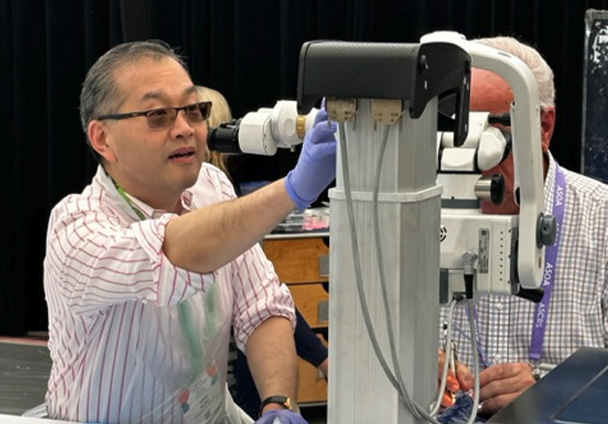Free LASIK Consultation: Call (855) 875-2020 9:00am–5:00pm

Diabetic Eye Disease is actually a group of eye conditions that can affect people with diabetes (including type 1, type 2, and gestational diabetes). These include diabetic retinopathy, diabetic macular edema (DME), cataracts, and glaucoma. All of these conditions can potentially lead to severe vision loss or even blindness.
Diabetic retinopathy is the most common cause of vision loss in people with diabetes and is the leading cause of visual impairment and blindness in working-age adults. Diabetic retinopathy is a complication of the eyes that affects people with diabetes. It is caused by damage to the blood vessels of the retina. These damaged blood vessels can leak extra fluid and or blood into the retina. At first, you may not notice any symptoms or only minor visual symptoms. This condition can develop in anyone who has type 1 or 2 diabetes. The longer the exposure to diabetes and the worse the blood sugar control, the more likely you are to develop diabetic retinopathy or even retinal detachment.
There are various stages of diabetic retinopathy, including early diabetic retinopathy and advanced. In-office procedures, such as laser treatment and intraocular injections, can be very effective at preventing further vision loss.
People with all types of diabetes are at risk for developing diabetic retinopathy, and the risk increases the longer a person has diabetes. Of all Americans diagnosed with diabetes, 40 to 45 percent have some degree of diabetic retinopathy, but only about half of those are aware of it. Other risk factors include those with high blood pressure, high cholesterol, regular tobacco use, or pregnancy.
Gain a deeper understanding about the topics, conditions, and procedures discussed on this page by watching our informational videos.
Diabetic macular edema (DME) occurs when fluid builds up (edema) in a part of the retina called the macula. The macula is responsible for the sharp, straight-ahead central vision you use to recognize faces, read or drive. DME is the leading cause of vision loss in people with diabetic retinopathy. DME can happen at any stage of diabetic retinopathy and will affect about half of all people with the disease.
Diabetic retinopathy will often go unnoticed until it begins affecting vision because in its early stages there are usually no symptoms. When bleeding from abnormal blood vessels in the retina eventually occurs, it can cause the appearance of spots or floaters. At that point, without prompt treatment, you increase your risk for DME and permanent vision loss. That is why it is so crucial for diabetic patients to have comprehensive dilated eye exams at least once a year.
Cataracts are also a big problem for patients with diabetes. A cataract is a clouding of the natural lens in the eye. Cataracts are most often associated with age but tend to develop earlier in people with diabetes. Adults with diabetes are 2 to 5 times more likely to develop a cataract than those without diabetes. Early cataracts can be treated with corrective lenses, but when cataracts begin to interfere with vision the cataract surgery will be required.
Glaucoma is the leading cause of blindness in the U.S. and refers to a group of disorders associated with abnormally high intraocular pressure that can cause damage to the optic nerve, the bundle of nerve fibers that connects the eye to the brain. For adults with diabetes, their risk of developing glaucoma is nearly doubled. As with diabetic retinopathy, the onset is so gradual that it can easily go unnoticed until it reaches its advanced stages and permanent damage has already been done. For patients with diabetes, it is especially important to have regular visits with an ophthalmologist. Symptoms to watch out for include:
If you are living with diabetic eye and need eye care, please call us today at either our Staten Island or East Brunswick, NJ offices. We will be happy to assist you in any way that we can.
Please call our New York office at (929) 429-2928 or our New Jersey office at (732) 724-2535 with any questions you may have.
STATEN ISLAND, NY EAST BRUNSWICK, NJ
Dr. Kung’s mastery in ophthalmology means you will receive thoroughly informed recommendations for vision correction and maintenance, and that your treatment will be expertly performed for the best possible results.
MEET THE DOCTORS